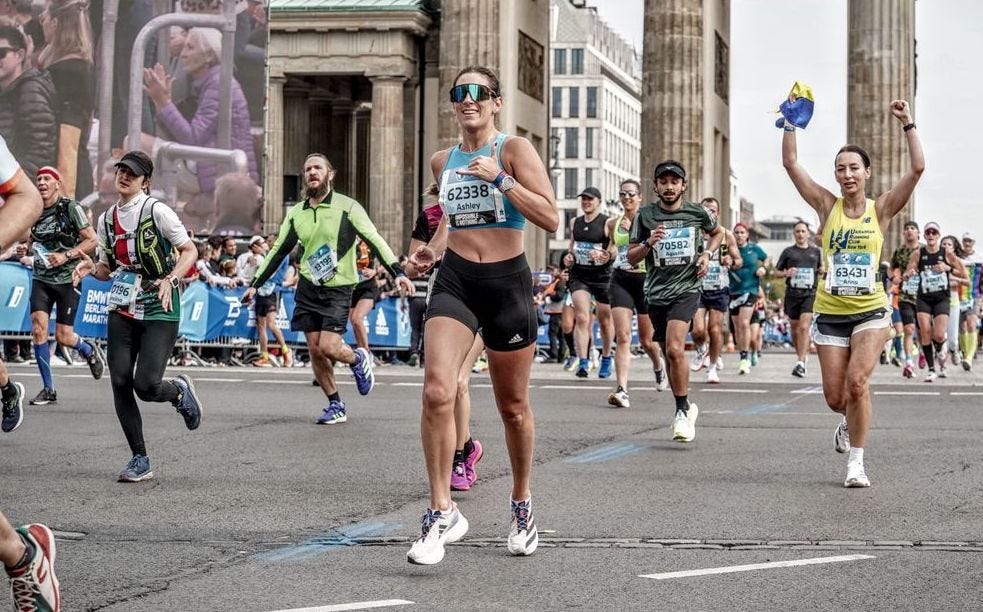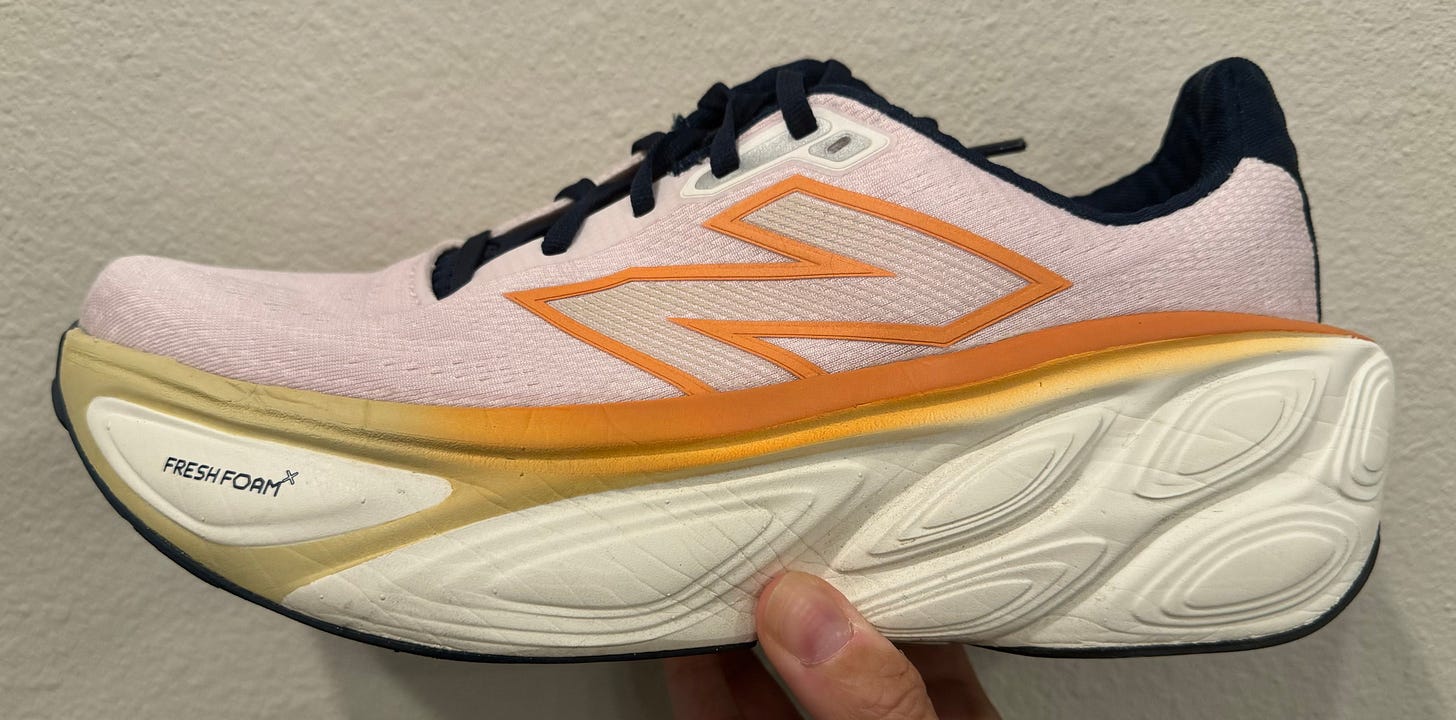Re-Framing Failure
A lot of what happens on race day is outside of your control, but only you can decide how you view the end result.
A couple years ago, I ran the Berlin Marathon. I had a time goal in mind, and all my fitness indicated that I was primed for that pace. But by mile 8, I knew that my heart wasn’t in it. One of my closest friends was texting me encouragement, and around mile 11 I caved and called her. Yes, called her. In the middle of the marathon.
I remember telling her I was going to drop out at the halfway point. I knew I wasn’t going to run my goal time, so I just didn’t want to run anymore; what was the point? “I don’t give a shit if you run that time,” she responded. “I’m just impressed that you’re out there running another marathon.” She knew I’d be more disappointed in myself afterwards if I quit than if I failed to reach my goal, and I needed that reminder that a time goal wasn’t the only way to define success. I finished the race.
Runners put so much pressure on themselves to succeed. It’s a sport that attracts a type A personality, and so many of those who participate in it approach training and pursuing their goals with the belief that if they just do X, Y, and Z perfectly, they can guarantee an outcome. And if they don’t achieve the outcome they had in mind? In their minds, they’ve failed. (Yes, I’m speaking from personal experience.)
But there are no guarantees in running, and that gets truer the longer the distance. There are just too many variables runners have to contend with over the course of 26.2 miles (or more) to accurately predict an outcome. It’s inevitable that sometimes those variables will get the best of you. Running is an unforgiving sport, but not meeting your goal doesn’t mean you failed.
The running industry and community put so many arbitrary benchmarks around running. You’re a good runner if you can run this time. You’re a bad runner if you can’t finish before that time. That’s all bullshit.
Just look at the Boston Marathon qualifying times. Runners hold this race up as the pinnacle of the amateur side of the sport, and it is a huge achievement. But I can’t tell you how many runners have this idea that qualifying for Boston will validate them as a runner in some way. The problem: The Boston Marathon qualifying time is a moving goal post. The race just dropped the 2026 qualifying times by 5:00 minutes for the majority of age groups. Those who met the standard for their age group and just registered for the 2025 race have no guarantee of entry either; there’s likely to be a huge cutoff due to field size limitations.
The B.A.A. won’t and can’t predict the "cut-off" time needed to gain acceptance into the race. In 2023, all runners who qualified and entered the Boston Marathon were accepted to run. One year later, the 2024 Boston Marathon's qualifying cutoff time was 5 minutes and 29 seconds faster than the minimum qualifying time. It’s possible that you could have met the standard in 2023, and run the same exact time in 2024 and missed the cutoff. Does that make you a worse runner? Absolutely not. It just means that while accommodating for growing interest in the sport and accounting for limitations in location and event personnel, an organization had to cap the field size. It’s not personal, so why do we interpret it that way?
You’re no less of a runner if you cross the finish line of a race after an official cutoff time. Those times are there for a reason, but they shouldn’t define how you look at your performance. Continuing to the finish even when you know your time won’t officially count takes a ton of grit and perseverance. If you covered the distance, you’re still a finisher, no matter what the race records say.
Events have to have parameters. But those who participate in sport need to understand that those parameters shouldn’t affect their self-worth. When you do, you’re letting fear and insecurity dictate your relationship with running. Boston qualifying times, Olympic qualifying times, official finishing times, a specific pace—these can be worthy goals, but too often people “falsely attribute those to being the solution for needs—to be seen, to be valued, to be understood, to feel like you matter—that we have as normal human beings,” sports psychologist Emily Saul recently told me during an interview. “People might have a belief that ‘If I do this, then I'll finally feel enough’ or like they have accomplished or proven whatever the thing is they feel like they need to prove.”
Every runner should be motivated by feeling a sense of pride and satisfaction and accomplishment from their running. But the kind of external validation that comes from clinging to the “official” parameters of what defines a “good run” or “good runner” only lasts so long. Once the Instagram likes and Strava kudos stop trickling in, that void you’re trying to fill will still be there. And running is never going to fix it. You have to be driven by your own benchmarks of success.
There’s another factor in runners’ fear of failure: People are deeply afraid of disappointing others by not performing the way they think they should on race day. “They feel like, ‘I've already asked so much of my family and my friends to put so much time and energy into this, and so if I don't have not only a product, but the product that I've essentially built up as my promise to them, then I will be letting them down and have disappointed them or wasted their time or their investment. They won't be willing to support me going forward,’” says Saul.
I promise you, if you don’t achieve your goal in a race, your running coach is not going to be disappointed in you. The people who came out to support you are not going to be disappointed in you. Your friends and family are not going to be disappointed in you.
You’re running for you. And you should always be chasing your best, whatever “best” means to you—not something determined by anyone else. It’s OK to be disappointed when things don’t go as planned, but beating yourself up over a bad day will only set you back further. Without struggle, there can’t be progress.
Every race, good or bad, is a learning experience.You can choose to look at a bad one as a failure, or you can choose to look at it as another step forward. That’s up to you.
the rundown
New Balance Fresh Foam X More v5
“More” is definitely the key word when it comes to the New Balance Fresh Foam X More v5. I loved the last version of this shoe for recovery runs, and it’s been updated with more stack (there’s now 44 millimeters of foam underfoot), a wider platform (which makes it even more stable), and a new rocker geometry (that gives it more forward momentum). It’s also been updated with the same lightweight, bouncy foam you’ll find in the 1080v13. I felt like the shoe lost a bit of its squishiness with this upgrade, but the overall package is super plush and comfy—I’ve consistently found myself reaching for these any time my feet are feeling a little beat up post-workout or long run. And at $155, they feel a little more affordable than some similarly maxed out easy running shoes.
Endurance Athletes May Need More Protein On Recovery Days Than Training Days
Pour me out another Core Power protein shake! (I swear, these things are the only way I survive marathon training, and I’m paying for them myself.) Runners could benefit from upping their protein intake more on recovery days over training days, according to an August 2024 study in the journal Applied Physiology, Nutrition, and Metabolism. When study participants—seven men, so a very limited sample size—followed a standardized diet and training protocol for two days, amino acid oxidation data (a stand-in for whole body protein synthesis) showed that protein requirements may be highest during recovery days (12-24 hrs post-exercise). Go ahead and add a protein-based snack and/or up your protein portion sizes at meals after your hardest days.
The Man Who Made Nike Uncool
What a headline, right? Nike may still be a dominant force on race courses, but I find the behind-the-scenes looks at what the company has been doing to fumble that position so interesting. The latest is a deep dive from Business Week that examines how Chief Executive Officer John Donahoe has applied “Silicon Valley sensibilities” to the sports giant—and how that’s backfired. It looks at what brought the man from consulting firm Bain & Co. and eBay to Nike, and how his strategies have made it so the company is vulnerable to top competitors—including upstarts such as Brooks, Hoka, On, and Salomon.
Bandit Aurora Gridlock Race Crop
I have to shout out this performance crop from Bandit Running—even though it’s sold out—because I think it’s the holy grail of running tops and you should get on the waitlist for it ASAP. The Aurora addressed my one complaint about the six-pocket Nova Crop, which was a missing cell phone pocket on the racerback; this design has seven pockets: four for gels at the lower back, two side pockets for your phone or more gels, and that cell phone pocket on the upper back. It’s a game-changer for carrying fuel (especially larger packets) during long runs, and you’ll definitely see me wearing this for my fall marathon.





We all “fail” but you have to fail happy! I also wonder who that lucky friend was that you called 😉😘
This was good to hear. My start from running was being in track and cross country in high school. I was the slowest person on varsity and on the relay team. It can be hard to get out of that mindset that being runner has to mean meeting X goal and to accept that I'll never be the fastest runner. But that doesn't need to be my goal.
I'm happy to see there's such a growing push to make exercise less performance oriented and goal focused. Hopefully this will trickle down to school sports.